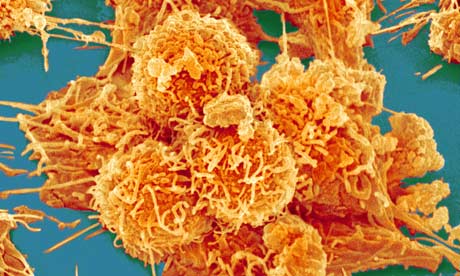
A leading insurance company has changed the terms of its private medical cover to ensure policyholders suffering from late-stage prostate cancer can be treated with the drug abiraterone.
Axa PPP, the second biggest private medical insurance company in the UK, providing cover for more than 2 million people, has changed its stance on the drug and will now consider it eligible for benefit and will pay for it.
A spokesman, John DuBois, said: "We have done this because we believe it is the right thing to do."
Policies from Bupa, the market leader, and WPA already covered treatment with the drug, which costs £3,000 a month per patient.
Dr Annabel Bentley, the medical director of Bupa Health and Wellbeing, said: "If a cancer drug is licensed by the EMA [European Medicines Agency] and is clinically appropriate for our members, we will fund it regardless of cost.
"Bupa routinely funds abiraterone for members whose prostate cancer has spread. We fund cancer treatments for as long they are needed and we do not apply cost or time limits."
Trials of abiraterone found that the drug extended patients' lives by an average of four months and reduced the pain they suffered. The EMA licenced it for use in the UK in September last year, but the National Institute for Health and Clinical Excellence (Nice) has issued a draft decision that the drug is too expensive for use in the NHS.
About 480 NHS patients in England have been treated with abiraterone since November through the Cancer Drugs Fund, a £200m-a-year fund set up by the government in 2010 to enable cancer sufferers to benefit from drugs not approved by Nice or not yet available through the NHS.
Patients in England apply through their clinicians for funds, which are administered by strategic health authorities around the country. In the rest of the UK, patients must apply to an exceptional case committee for treatment.
Money for the Cancer Drugs Fund dries up in March 2014, when it will be replaced by a "value-based pricing" system, and future funding arrangements for drugs including abiraterone are uncertain.
Sarah Woolnough, the director of policy at Cancer Research, said: "At the moment you can get abiraterone through the Cancer Drugs Fund, but it's an issue of concern that the tap might be turned off. It is unclear what will happen under the new system when Nice has said no to a drug."
Owen Sharp, the chief executive of the Prostate Cancer Charity, said Nice's decision was a bitter blow to thousands of men and their families.
"Quite simply, abiraterone prolongs the life of men with incurable prostate cancer. The drug is one of the biggest breakthroughs in the treatment of the disease for many years and it will be devastating if this drug remains out of their reach when they need it the most."
Rick Betton, who was diagnosed with aggressive prostate cancer in July 2010, is claiming for abiraterone through his employer's PMI scheme. He was previously prescribed two different drugs through the NHS which failed to work, but when his consultant applied to the NHS for abiraterone he was rejected.
"I thought it was worth seeing whether I could claim through my Bupa policy, and they now deliver the drugs by courier every three weeks to my home. I take four pills every morning," he said.
Betton was diagnosed with prostate cancer after collapsing following a night out. "I was staying in a hotel and woke up in the night sweating and with a pain in my back. I got home but collapsed on the drive, and blood tests confirmed I had cancer three days later."
Betton said the drug had enabled him to regain some of the weight he had lost and to carry out some of the day-to-day functions his wife, Rachel, had been doing for him. "I am finding life a lot more comfortable, and felt better in myself. My condition seems to have stabilised. It meant I could walk my eldest daughter Gabriella down the aisle in November. I wouldn't have been able to do that without abiraterone."

